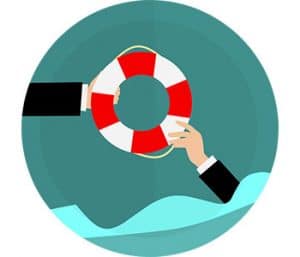
The term bankruptcy is filled with negative connotations. To set the record straight, bankruptcy does not mean that you or your business are finished. Is it serious stuff? Yes, but it’s not necessarily financial ruin. Bankruptcy isn’t as bad as it sounds because it gives an individual the opportunity to fix financial errors and dig oneself out of the financial hole that has been dug.
The “benefits of bankruptcy” may sound like a contradiction similar to “jumbo shrimp”, but there are actually lots of benefits. Bankruptcy laws were established to restore hope, help those struggling with financial hardship, and give people relief from facing what appears as insurmountable debt. Bankruptcy may help in the following ways:
While the concept of bankruptcy is fairly simple, there are many reasons to file, and therefore, there are several types. Let’s look at the most common ones:
Chapter 7 – When you hear people say, “I’m filing for bankruptcy,” they are often referring to Chapter 7. Known as a liquidation bankruptcy, Chapter 7 is when the trustee sells off all non-exempt assets held by the debtor to allow debts to be repaid as much as possible. If any debt can’t be repaid through liquidation, then it is discharged. Individuals, corporations and partnerships are all eligible for Chapter 7; however, only individuals reap the benefit of the discharge.
Chapter 11 – This type of bankruptcy is typically used by businesses that find themselves in trouble or for individuals that need to reorganize, but due to debt limits, do not qualify for a Chapter 13. Here, the debtor can either choose to liquidate its own assets or continue to operate, maintains ownership of assets, and is given the opportunity to create a reorganization plan to pay off creditors. As we’ve previously written, since Chapter 11 historically was geared more to larger businesses and corporations, Congress passed the Small Business Reorganization Act of 2019, which was temporarily amended by The CARES Act to help small businesses afford their reorganization plans.
Chapter 13 – This type of bankruptcy is for individuals only and is a great tool to help a person reorganize their debts. Here, the debtor keeps control and ownership of assets, can cure a default on a mortgage or car, and establishes a three to five-year repayment plan. The amount of debt that can be discharged depends on the individual’s income and value of assets.
It’s important to separate fact from fiction when understanding bankruptcy. To that end, here are common misconceptions:
Irresponsible people file for bankruptcy – People are human and some choices they make have unintended consequences. Bankruptcy gives you the opportunity to right the ship and rebuild. Due to unforeseen circumstances like serious illness, injury, or natural disaster, people have no choice but to file for bankruptcy to get them back on their financial feet.
Everyone is eligible for bankruptcy – It is a constitutional right to file, but a person must qualify for the Chapter of bankruptcy they wish to utilize. You must meet certain criteria like the Means Test for Chapter 7 or have enough disposable income for a debt reorganization by Chapter 13.
Bankruptcy destroys your credit – It actually does the opposite long-term. While bankruptcy does impact your credit, it is also meant to restore it by wiping the slate clean. Bankruptcy can stay on your record for up to 10 years, but it also allows you to raise your credit score by removing debt.
All debt qualifies for bankruptcy – Bankruptcy isn’t a panacea for all of your debts. For example, all student loans and tax debts can’t be discharged. In addition, it doesn’t eliminate governmental fines, child support, and alimony obligations, nor is it a guarantee that debt related to fraud or intentional acts will be discharged.
Filing for bankruptcy can serve as a lifeline if your financial situation is in dire straits. In the face of the pandemic, your personal finances and business can still be saved.
To put 40+ years of combined experience in your corner, call (847) 200-0401 or contact us online today. We can begin with a complimentary, virtual consultation. Please follow us on Facebook and LinkedIn.